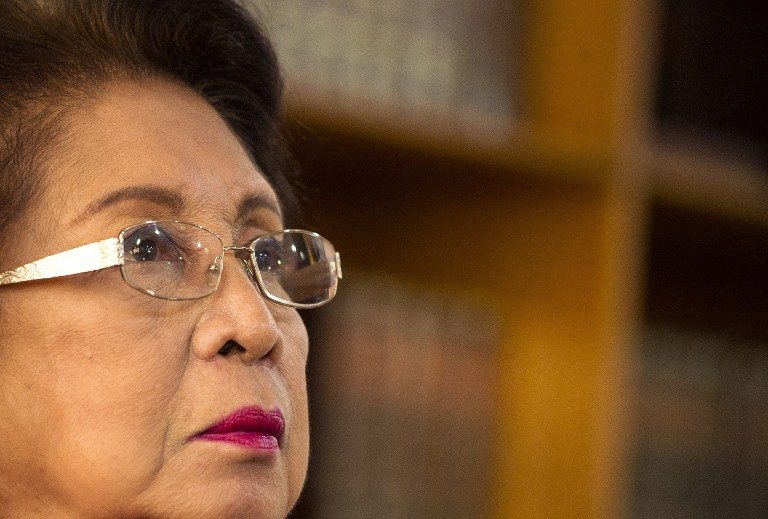SUMMARY
This is AI generated summarization, which may have errors. For context, always refer to the full article.

MANILA, Philippines – Former Manila city councilor Greco Belgica filed before the Supreme Court on Friday, March 24, a disbarment case against Ombudsman Conchita Carpio-Morales, citing supposed violations in the lawyers’ code when she absolved former president Benigno “Noynoy” Aquino III of criminal charges over the Disbursement Acceleration Program (DAP).
But can the Ombudsman be disbarred?
“To afford the Ombudsman maximum independence and protection, the Constitution prohibits removal of the Ombudsman during her fixed term except through impeachment. Allowing disbarment would allow an easier second method of removing her from office – a method not provided in the Constitution,” lawyer Oscar Tan pointed out.
Article IX, Section 2 of the Constitution is categorical: “The President, the Vice-President, the Members of the Supreme Court, the Members of the Constitutional Commissions, and the Ombudsman may be removed from office on impeachment for, and conviction of, culpable violation of the Constitution, treason, bribery, graft and corruption, other high crimes, or betrayal of public trust.” (Emphasis supplied)
The Constitution is reiterated in the law which is clear about the removal of an Ombudsman. Republic Act 6770 says: “In accordance with the provisions of Article XI of the Constitution, the Ombudsman may be removed from office on impeachment for, and conviction of, culpable violation of the Constitution, treason, bribery, graft and corruption, other high crimes, or betrayal of public trust.”
The same law also requires the Ombudsman to be a member of the bar, specifying that “the Ombudsman must have, for ten (10) years or more, been a judge or engaged in the practice of law in the Philippines.”
SC rulings
Earlier Supreme Court rulings (SC) also afforded the Ombudsman the same protection from disbarment.
In Ombudsman v. Court of Appeals and Mojica decided by the SC’s second division in 2005, the High Court said: “the Ombudsman or his deputies must first be removed from office via impeachment before they may be held to answer for any wrong or misbehavior which may be proven against them in disbarment proceedings.” (Emphasis supplied)
The 2005 decision cites earlier rulings, too, from a 1988 disbarment case against then Associate Justice Marcelo Fernan:
“There is another reason why the complaint for disbarment here must be dismissed. Members of the Supreme Court must, under Article VIII (7)(1) of the Constitution, be members of the Philippine Bar and may be removed from office only by impeachment (Article XI [2], Constitution). To grant a complaint for disbarment of a Member of the Court during the Members incumbency, would in effect be to circumvent and hence to run afoul of the constitutional mandate that Members of the Court may be removed from office only by impeachment for and conviction of certain offenses listed in Article XI (2) of the Constitution. Precisely the same situation exists in respect of the Ombudsman and his deputies (Article XI [8] in relation to Article XI [2], id.), a majority of the members of the Commission on Elections (Article IX [C] [1] [1] in relation to Article XI [2], id.), and the members of the Commission on Audit who are not certified public accountants (Article XI [D] [1] [1], id.), all of whom are constitutionally required to be members of the Philippine Bar.” (Emphasis supplied.)
The decision also cites a ruling in the 1995 disbarment case against then Ombudsman Aniano Desierto:
“. . . [T]he court is not here saying that the Ombudsman and other constitutional officers who are required by the Constitution to be members of the Philippine Bar and are remova[ble] only by impeachment, are immunized from liability possibly for criminal acts or for violation of the Code of Professional Responsibility or other claimed misbehavior. What the Court is saying is that there is here a fundamental procedural requirement which must be observed before such liability may be determined and enforced. The Ombudsman or his deputies must first be removed from office via the constitutional route of impeachment under Sections 2 and 3 of Article XI of the 1987 Constitution.“ (Emphasis supplied)
Belgica on Friday also expressed an intent to file an impeachment complaint against Morales. The Volunteers Against Crime and Corruption (VACC) have echoed the same intent. – Rappler.com
Add a comment
How does this make you feel?
There are no comments yet. Add your comment to start the conversation.